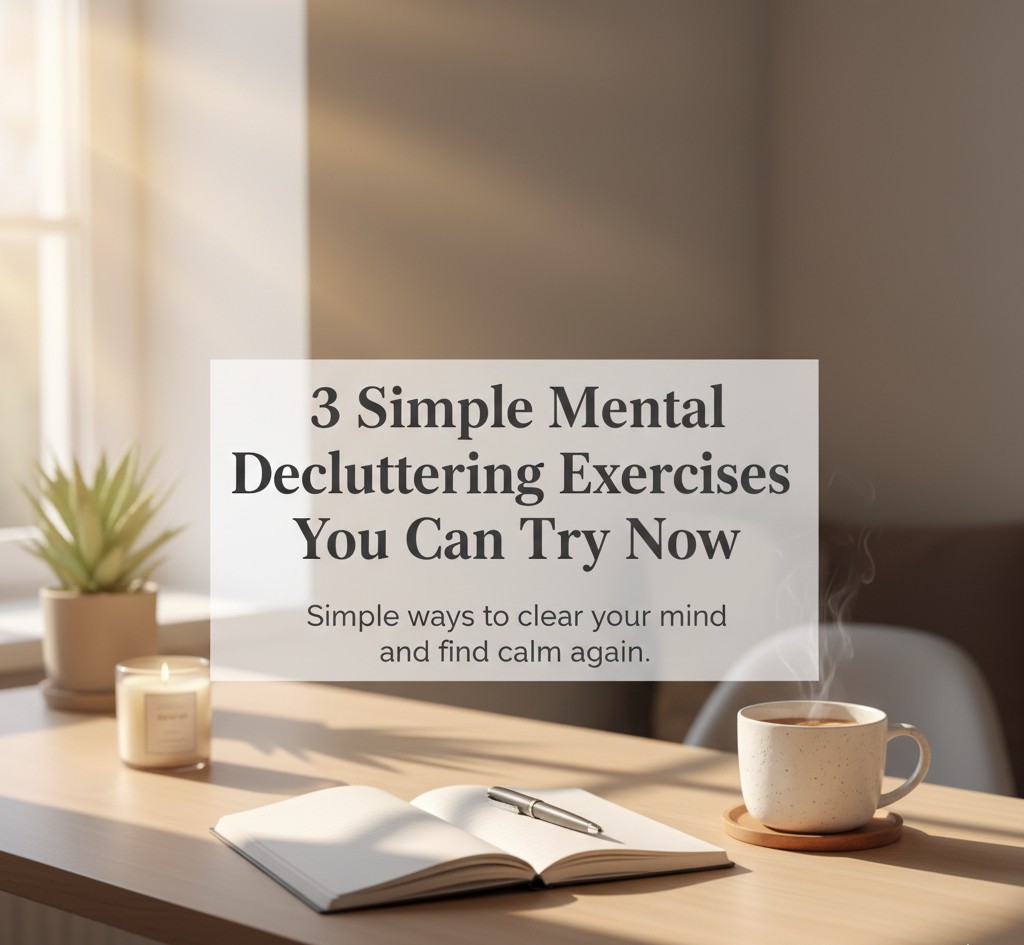Ever feel like your mind has too many browser tabs open? One thought loading while another crashes, and suddenly you’ve forgotten what you were even doing. We’ve all been there—the mental clutter, the constant noise, the struggle to switch off even when we’re “resting.”
In my previous post, “Declutter Your Mind: Mental Minimalism 101”, I explored why simplifying your mental space matters and how it affects focus, creativity, and calm. But knowing why you need it is only half the story.
Today, let’s get practical. Below are three simple mental decluttering exercises you can start right now—no apps, no strict routines, no pressure. Just gentle, mindful practices designed to clear your head and make space for clarity.
Ready to breathe a little easier?
1. The Mental Dump: Empty Your Thoughts to Regain Space

When your brain feels like it’s juggling a dozen reminders, ideas, and worries, it’s time for a mental dump. Think of it as decluttering your mental desktop.
Grab a notebook or open a blank note on your phone and write everything that’s taking up mental space—unfinished tasks, random worries, grocery lists, even that email you keep postponing. Don’t edit. Don’t judge. Just release.
Why it works:
Writing gives your mind permission to stop holding onto every detail. Once thoughts are out of your head and onto paper, they lose their emotional charge.
How to do it:
- Set a timer for 5 minutes.
- Write every thought that crosses your mind.
- When the timer ends, read through and highlight what truly needs attention.
- Cross out anything that’s just noise.
Key takeaway: You can’t organize your mind when it’s full. Empty first, then prioritize.
I do this every Sunday night—it turns the overwhelm of “I have too much to do” into a clear list of what actually matters.
2. The Single-Task Reset: Reclaim Your Focus in Real Time

Multitasking is the illusion of progress. It feels productive, but it quietly drains your attention. A simple single-task reset helps you refocus when your brain feels scattered.
Here’s how:
- Pause whatever multitasking chaos is happening.
- Pick one small task—answer one email, fold one stack of laundry, write one paragraph.
- Do only that task for 5 minutes, no switching.
- When finished, take a slow, mindful breath before moving to the next.
This tiny ritual retrains your brain to find satisfaction in completion, not chaos. It’s like pressing a mental “refresh” button.
Key takeaway: Focus isn’t a personality trait—it’s a practice. You can rebuild it one mindful task at a time.
Pro tip: If you struggle with this, try using the Pomodoro method or an app like Forest (affiliate link) to gamify your focus time.
3. The 3-Question Reflection: Simplify Your Inner Dialogue

Mental clutter isn’t just tasks—it’s often thought loops. You replay conversations, second-guess choices, or worry about what’s next. When that happens, this 3-question reflection cuts through the noise.
Ask yourself:
- Is this thought helpful or harmful?
- Can I do something about it right now?
- If not, can I release it for now?
It sounds deceptively simple, but this quick check brings awareness back to the present. You’ll notice how many thoughts are unproductive by habit alone.
Key takeaway: Awareness turns rumination into release. Naming a thought gives you control over it.
Personal note: I keep these three questions on a sticky note above my desk. Some days, it’s the smallest reminder that keeps my mind from spiraling.
Bonus: Combine Them for a Weekly “Mind Reset” Ritual
These mental decluttering exercises are powerful on their own—but when practiced together, they create a sustainable rhythm.
Here’s what that might look like:
- Sunday evening: Do a 5-minute mental dump.
- Monday morning: Start with a single-task reset.
- Midweek: Use the 3-question reflection whenever you catch your mind looping.
Over time, this becomes less of a “routine” and more of a mindset—an effortless calm you carry into your week.
Conclusion
Your mind deserves the same care and simplicity you give your physical space. These mental decluttering exercises aren’t about perfection—they’re about presence. A few minutes of awareness can shift your entire day from chaos to clarity.
Try one exercise this week and notice what changes. Maybe it’s better focus, maybe it’s just quieter mornings—but either way, that’s progress worth celebrating.
If this resonated with you, you’ll love “Declutter Your Mind: Mental Minimalism 101” — a deeper guide to understanding how simplicity can reshape the way you think, create, and live.
Start small. Think clearly. Live lightly.




